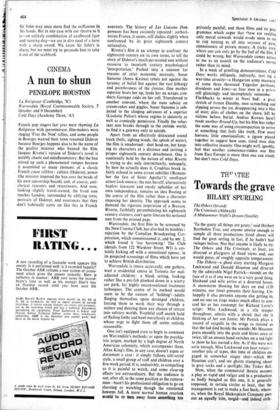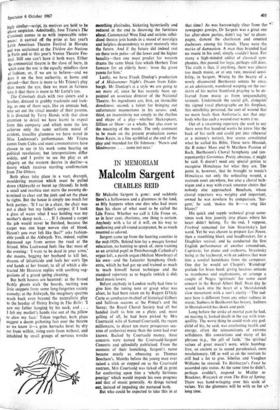The Others (Strand)
THE' \TRE
Towards the grave
HILARY SPURLING
The Criminals (Aldwych) A Midsummer Night's Dream (Saville) 'To the gouty all things are gouty,' said Herbert Beerbohm Tree, and anyone unwise enough to sample all three productions listed above will find the gout setting in fast, if he hadn't had twinges before. Not that anyone is likely to try. The Others and The Criminals, at least, are directed at playgoers of fixed views and, one would guess, of roughly opposite temperament.
The Others—a ghost story starring Margaret Lockwood and Donald Houston and directed by the admirable Nigel Patrick—sounds on the face of it as if one were on to a very good thing. Husband and wife arrive at a deserted house. A snowstorm blowing for days on end (120 minutes, our time) prevents their leaving. Un- happily it also prevents anyone else getting in, and no one on stage makes much effort to con- ceal his or her contempt for Richard Lortz's script : Miss Lockwood, in a vile temper throughout, admits with a shriek that she is thinking of her son Jamie; Mr Patrick plays a record of seagulls in the wings to remind us that the lad died beside the seaside; Mr Houston peers moodily into the grate and blows once or twice, till an unseen hand switches on a red light to show he has started a fire. As if this were not eerie enough, Miss Lockwood can hear voices— another pile of tapes, this time of children en- gaged in somewhat stagey chat—which Mr Houston can't, and' see ghosts stumping about in grey socks and a. spotlight, like Tinker Bell.
Now, when the commercial theatre mounts a play as vapid and vulgar and in a production as badly bungled as this- one, it is generally supposed, in certain circles at least, that the management is out to make a fast buck; where- as, when the Royal Shakespeare Company puts out an equally trite, turgid—and indeed strtk- jngly similar—script, its motives are held to be above suspicion. Admittedly, Jose Triana's The Criminals comes to us with impeccable refer- ences: it carried off the prize at last year's Latin American Theatre Festival in Havana and was acclaimed at the Thetitre des Nations in Paris and at this year's Venice Theatre Fes- tival. Still one can't have it both ways. Either the commercial theatre is the slave of lucre,, in which case the RSC is the equally mindless slave of fashion; or, if we are to believe—and we have it on the best authority, at home and abroad—that there is more to Mr Triana's play than meets the eye, then we must in fairness take it that there is more to Mr Lortz's too.
The Criminals deals with two sisters and a brother, dressed in grubby tracksuits and look- ing, as one of them says, like an unmade bed, who act out the ritual murder of their parents. It is directed by Terry Hands with that close attention to detail we have learnt to expect from this company and which none the less achieves only the same uniform mood of strident, irascible glumness we have noted in Miss Lockwood's performance. Mr Triana comes from Cuba and most commentators have chosen to see in his work some bearing on political revolution; but interpretations differ widely, and I prefer to see the play as an allegory on the western theatre in decline—a theory which receives startling confirmation from The Others.
Both plays take place in a vast, decrepit, mouldering mansion which must be pulled down (Aldwych) or burnt up (Strand). In both a small and resolute cast starts the evening de- termined to clear out the junk and set the place to rights. But the house is simply too much for both parties: 'If I sat in a chair, the chair was not a chair but my father's corpse; if I took a glass of water what I was holding was my mother's damp neck. . . If I cleaned a carpet the job would never be finished, because the carpet was one huge woven clot of blood. Haven't you ever felt like that?' asks fashion- able youth at the Aldwych. Yes, indeed, replies depressed age from across the road at the Strand. Miss Lockwood feels like that most of the evening: 'I want to be dead in your arms,' she moans, begging her husband to kill her, dreams of infanticide and feels her son's lips and hands at her breast; to all of which a dis- tracted Mr Houston replies with soothing sug- gestions of a grand spring cleaning.
But both houses are haunted: at the Strand fleshly ghosts stalk the boards, reciting wan little snippets from some long-forgotten society comedy; at the Aldwych, the imaginary spectres reach back even beyond the naturalistic play to the heyday of Henry Irving in The Bells: 'I saw my father hanging by his neck, and . . . I felt my mother's hands rise out of the pillow to claw my face.' Taken together, both plays suggest a doom gathering fast over the theatre as we know it—a grim barracks beset by dry rot from within, rising costs from without, and inhabited by small groups of nervous wrecks
mouthing platitudes, bickering hysterically and seduced in the end to throwing the furniture about Commercial West End and serious subsi- dised theatre join hands in a mood of nostalgia and helpless despondency to peer morosely into the future. And if the future did indeed rest on these twin poles—of the lower and the higher banality—then one must predict for western drama the same bleak fate which Herbert Tree foresaw for an elderly bore: 'even the grave yawns for him.'
Lastly, we have Frank Dunlop's production of A Midsummer Night's Dream from Edin- burgh. Mr Dunlop's is a style we are going to see more of, since he has recently been ap- pointed an associate director of the National Theatre. Its ingredients are, first, an invincible dowdiness; second, a talent for bringing out unfortunate mannerisms in his actors; and, third, an insensitivity not simply to the rhythm and shape of a play—whether Shakespeare, Sillitoe or Shaw—as a whole, but also even to the meaning of the words. The only comment to be made on the present production comes from Keats, in a line scribbled at the end of the play and intended for Dr Johnson : `Newts and blindworms . . . come not near.'



































 Previous page
Previous page